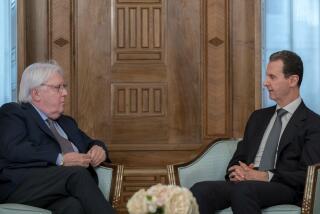Muslim States Meet; Rushdie on Agenda : No OK Seen for Iran’s Death Decree; King Fahd Asks Tolerance
- Share via
NICOSIA, Cyprus — Muslim nations opened a four-day meeting Monday in Saudi Arabia that is expected to reject Iran’s demands of support for its death sentence against British author Salman Rushdie.
Many Muslim countries have banned Rushdie’s novel “The Satanic Verses” on grounds that it blasphemes their religion, but Saudi Arabia opposes the execution order issued by Iran’s leader, the Ayatollah Ruhollah Khomeini.
In his welcoming speech to foreign ministers of the Organization of the Islamic Conference at Riyadh, Saudi Arabia’s King Fahd called on Muslims to be tolerant. He made no specific reference to Iran or to the international dispute surrounding Rushdie’s book.
He said the 46 member governments of the Islamic Conference should work toward unity “under the banner of our tolerant Muslim traditions.”
Saudi Arabian and other Muslim leaders are seeking to prevent Khomeini from using the Rushdie issue to project himself as the chief defender of the Islamic world and its people, estimated to number 1 billion. Islam’s holiest site, the city of Mecca, is in Saudi Arabia, and the kingdom’s leaders have long regarded themselves as the guardians of Islamic tradition.
Saudi Arabia broke diplomatic relations with Iran last year, charging that Iran, which is ruled by Shiite Muslim clerics, was fomenting terrorism among minority Shiites in Saudi Arabia’s Persian Gulf provinces.
Lower-Level Delegation
Apparently anticipating defeat on the Rushdie issue, Iran did not send its foreign minister to Riyadh, dispatching a lower-level delegation instead.
Mohammed Ali Taskhiri, Iran’s deputy minister of propaganda, told the delegates in Riyadh that he will propose “to boycott and condemn all colonialist movements against Islam and to uphold the sentence” against Rushdie.
Besides the Rushdie matter, which is expected to be relegated to a committee for study, the delegates are expected to take up the question of formal recognition of Afghanistan’s rebel government in exile.
Muslim political leaders are generally sympathetic toward the Muslim Afghan rebels opposing the Soviet-backed regime in Kabul, but they are said to be reluctant to establish a precedent in recognizing insurgent regimes. Also, several Muslim states have formal diplomatic relations with the Marxist government in Kabul.
Endorsed by 3 Nations
By the time the conference convened, only Saudi Arabia, Sudan and Bahrain had extended recognition to the rebels, known as the moujahedeen, the Associated Press reported from Riyadh.
Also on the agenda is the issue of a Palestinian political entity. Some delegates are expected to press for a declaration supporting the establishment of a Palestinian state in the Israeli-occupied territories and the restoration of Jerusalem, the third-holiest site in Islam, to Muslim rule.
Hamed Ghabid, the secretary general of the Islamic Conference, said in a statement opening the meeting that the Palestinian uprising in the occupied territories will be among the principal topics in Riyadh.
“We are witnessing a decisive turning point in the Islamic nation’s history,” he said, “thanks to the Palestinian uprising inside occupied Palestine and astounding diplomatic victories of the young Palestinian state at the international level.”
In Beirut, meanwhile, Britain said it is closing the consular and visa sections of its embassy in Lebanon today and repeated a call for Britons to leave the country because of the Rushdie affair, Reuters news agency reported.
Ambassador Allan Ramsay and his staff have been confined to the embassy in a suburb of Christian East Beirut since last Tuesday for fear of retaliation by pro-Iranian militants over the Rushdie affair.
Iran severed diplomatic relations with Britain over the novel Tuesday. It had demanded that London condemn the author of “The Satanic Verses.”
In London, visiting Canadian Prime Minister Brian Mulroney, whose government last month briefly halted imports of Rushdie’s novel, expressed support for Britain in its dispute with Iran after meeting with Prime Minister Margaret Thatcher.
“I expressed to Mrs. Thatcher the view of my government that . . . it is unacceptable for anyone to place a price on the head of a private citizen for any reason at all, least of all for the expression of a literary view,” Mulroney said.
And in Bonn, visiting Egyptian President Hosni Mubarak criticized Khomeini for ordering Rushdie’s death and called for a diplomatic settlement of the dispute.
Among aspects of “The Satanic Verses” to which Muslims object is a scene in which prostitutes are given the names of the Prophet Mohammed’s wives and the suggestion that the prophet wrote the Koran, the holy book of Islam, rather than receiving it from Allah.
Rushdie, 41, has been in hiding since Khomeini pronounced the death sentence Feb. 14 and Iranian clerics added a bounty of $5.2 million. He was born in Bombay to Muslim parents but now is a British citizen and has said he does not practice religion actively.
More to Read
Sign up for Essential California
The most important California stories and recommendations in your inbox every morning.
You may occasionally receive promotional content from the Los Angeles Times.













